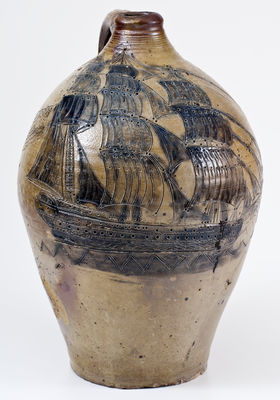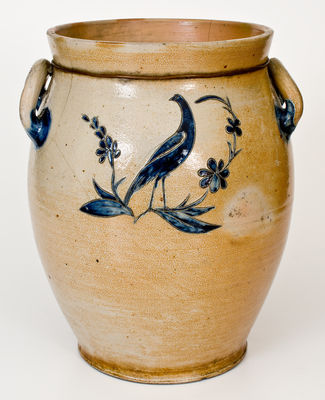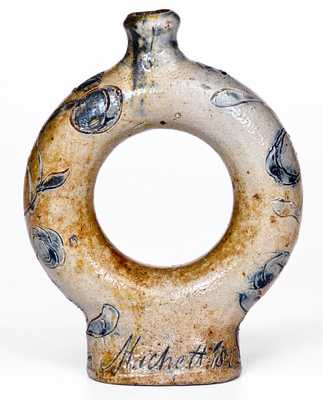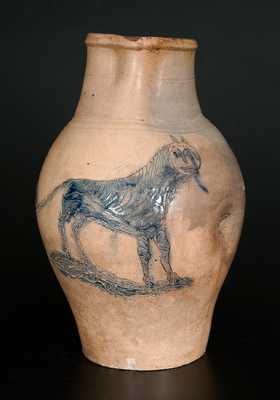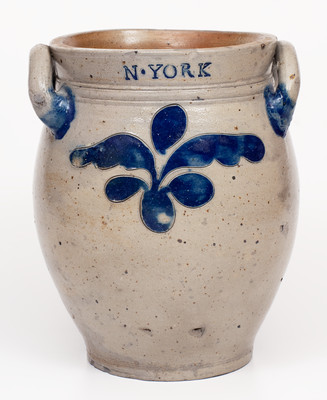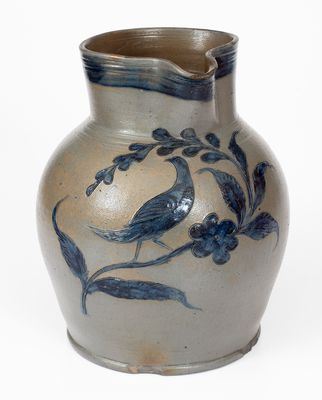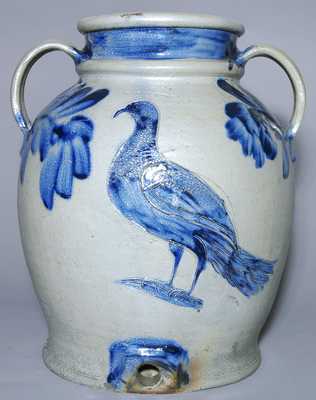Extremely Rare and Important Half-Gallon Stoneware Jug with New York City Advertising and Cobalt Wreath Decoration, Stamped "C.C. LAWRENCE, / MANUFACTURER, / PERTH AMBOY, / N. JERSEY", first quarter 19th century, small-sized, ovoid jug with tooled spout, featuring a slip-trailed wreath surrounding the impressed and cobalt-highlighted advertising, "HATHAWAY & RAWSON / NO 207 FRONT STREET /NEW-YORK" and the maker's mark, "C.C. LAWRENCE, / MANUFACTURER, / PERTH AMBOY, / N. JERSEY". Additional wavy slip-trailed line motif below wreath. Shoulder impressed with half-gallon capacity mark. According to Branin's The Early Maker's of Handcrafted Earthenware in Central and Southern New Jersey, the maker of this jug, Charles C. Lawrence, operated a stoneware pottery in Burlington, NJ, circa 1808-1814 (Branin, p. 94-95). A very few examples of stoneware (possibly only two) bearing a maker's mark from Lawrence's Burlington operation have survived, including one owned by the Monmouth County Historical Association, Freehold, N.J. and another sold in Crocker Farm's October 17, 2015 auction. Between 1814 and 1820, Lawrence operated potteries in the Philadelphia, PA area and in nearby Downingtown, PA (Branin, p. 95). This jug, however, is stamped with a Perth Amboy, NJ location, indicating that sometime after the sale of Lawrence's Burlington pottery in 1814, he had established a pottery in this historic, clay-rich city. To our knowledge, this jug is the only example of signed Lawrence stoneware known from his tenure in Perth Amboy. The employment of impressed advertising is most unusual for pieces of this period, revealing that Lawrence was somewhat innovative in the marketing of his ware. Even more unusual is the inclusion of his maker's mark with the advertising. This jug is possibly the earliest known example of American stoneware featuring a maker's mark and advertising on the same piece. The small size of the maker's mark indicates the potter wanted the consumer's primary focus to be on the merchant that the jug was made for. A significant recent discovery in early New Jersey stoneware. Missing handle. A 1 7/8" chip to bottom edge. Spout chips. A top-to-bottom vertical crack on side of pitcher, which curves upward onto shoulder of reverse, becoming a thin line on the jug's opposite side. Some fry to cobalt. Light surface. H 10".





